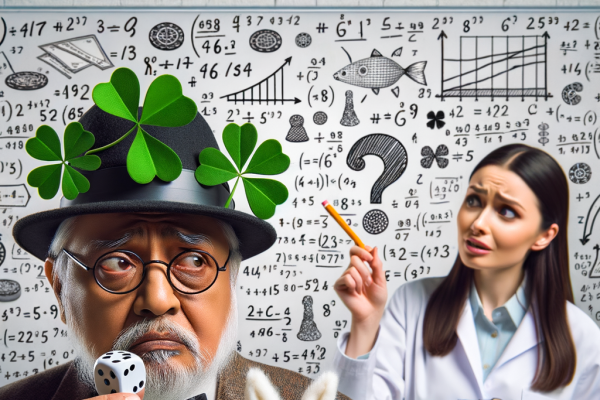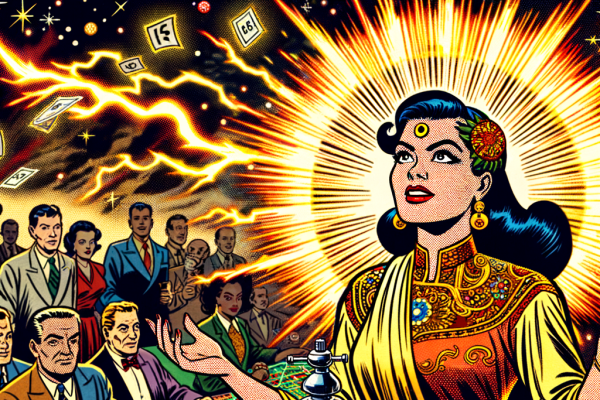The Role of Superstitions in Gambling Culture Worldwide
Superstitions have woven themselves into the fabric of gambling culture across the globe, providing a fascinating lens through which to examine human behavior. From Las Vegas to Monte Carlo, gamblers often cling to rituals and beliefs to navigate the uncertain world of chance. These superstitions can be as innocuous as a lucky charm or as elaborate as an entire pre-gambling routine designed to attract favorable outcomes. They reflect the human desire to exert some control over inherently unpredictable situations.
The prevalence of superstitions in gambling isn’t merely a curiosity; it can significantly influence player attitudes and behaviors. In many cultures, the act of placing a bet is not merely transactional; it’s deeply emotional. Gamblers engage in rituals that help alleviate anxiety and enhance their confidence. This psychological component amplifies the stakes, not just financially but also emotionally, as players seek solace in their beliefs and rituals.
As gambling has evolved, so too have the superstitions that accompany it. The rise of online casinos has not diminished the reliance on superstitions; instead, these beliefs have adapted. Virtual players might engage in different rituals, such as the timing of their bets or the sequences of their clicks, further illustrating how superstition thrives in a changing landscape. The fusion of technology with tradition underscores just how ingrained these beliefs are in the gambling psyche.
Despite the changing dynamics of gambling, one thing remains constant: superstitions serve as a coping mechanism. They provide comfort amidst the chaos of chance, allowing gamblers to feel active in the face of a passive game. Understanding this role is crucial for appreciating why individuals from various backgrounds adhere to peculiar beliefs when they step into a casino.
Luck or Folly: The Psychology Behind Casino Beliefs
The psychological underpinning of casino superstitions can be traced back to the human need for pattern recognition. People naturally seek connections between their actions and outcomes, leading them to develop beliefs that they believe can influence luck. This cognitive bias, known as illusory correlation, can result in gamblers associating specific actions with winning or losing, despite no causal relationship.
Furthermore, the concept of “locus of control” plays a critical role in gambling psychology. Gamblers with an internal locus of control tend to believe that they can influence outcomes through their actions, while those with an external locus feel that luck predominantly dictates their fate. Superstitions often serve as a bridge for those who feel helpless in the face of chance, offering a semblance of control over uncontrollable circumstances.
The social dimension of gambling also amplifies the influence of superstitions. Gamblers often share their beliefs and rituals with peers, creating a community of shared experiences that reinforce these superstitions. This collective validation can lead to a stronger adherence to these beliefs, as individuals feel supported and understood within their gambling circles.
In essence, casino superstitions are a fascinating interplay of psychology, community, and culture. They offer insights into how individuals cope with uncertainty and how social dynamics can shape personal beliefs. Understanding this complex relationship can help demystify the rituals and behaviors that define gambling culture worldwide.
Common Superstitions: Rituals That Define Casino Behavior
Certain superstitions recur across various gambling contexts, reflecting shared human experiences and anxieties. One of the most prevalent is the notion of “lucky numbers.” Many gamblers have specific numbers they believe are fortunate, often tied to personal significance, such as birthdays or anniversaries. This belief can drive behavior, such as choosing specific bets or numbers on a roulette wheel or lottery ticket.
Another common superstition involves the idea of “bad luck” associated with certain actions or behaviors. For example, it is widely believed that entering a casino with a certain foot, usually the right, can influence luck. Similarly, some players avoid wearing specific colors or clothing patterns that they associate with negative outcomes. The notion that certain physical attributes or actions can influence luck intertwines deeply with cultural narratives and personal experiences.
Rituals also take on more elaborate forms, such as the practice of “blowing on the dice” in craps or “spinning the wheel” in roulette. These actions, while seemingly trivial, create a sense of connection between the gambler and the game. Such rituals are often performed in the hope of influencing the outcome or at least providing a sense of control over the unpredictable nature of gambling.
In essence, these common superstitions and rituals are not just mere quirks but rather an integral part of the gambling experience. They shape how players engage with games, influence decision-making, and create shared traditions within the gambling community.
| Superstition | Description |
|---|---|
| Lucky Numbers | Personal numbers believed to bring good fortune. |
| Entering with Left/Right Foot | Entering casinos with a specific foot for luck. |
| Blowing on Dice | A ritual to influence the outcome in craps. |
| Color Associations | Avoiding or favoring certain colors for luck. |
Global Perspectives: Unique Casino Superstitions Explored
Across the globe, unique casino superstitions reflect the diverse cultural backgrounds of gamblers. In Asian cultures, for instance, the number “8” is considered extremely lucky, leading players to gravitate toward it during gambling. In contrast, the number “4,” associated with death in Chinese culture, is often avoided. This numerical superstition can shape game strategies, betting patterns, and even the design of casino layouts.
In contrast, Western cultures have their own set of peculiar beliefs. For example, in Las Vegas, it’s common for gamblers to wear red, as it is thought to attract good fortune. Some players even believe that carrying a rabbit’s foot or a four-leaf clover can enhance their luck. These beliefs often intertwine with cultural folklore, showcasing how history and tradition shape modern gambling practices.
Furthermore, in some African cultures, rituals such as animal sacrifices are believed to influence luck at gambling tables. While these practices might seem foreign to many, they underscore the lengths to which individuals will go to ensure favorable outcomes. Integrating spiritual elements into gambling rituals highlights the profound connection between cultural beliefs and the pursuit of luck.
These global perspectives on casino superstitions not only enrich the gambling experience but also highlight the diversity of human beliefs. They reveal how cultural narratives shape individual behaviors, creating a complex tapestry of rituals and practices that define the gambling world.
The Impact of Superstitions on Gambling Outcomes
While the impact of superstitions on actual gambling outcomes is a contentious topic, they undeniably affect the experiences of gamblers. Many players claim that their beliefs and rituals provide them with confidence and a positive mindset, which can influence their decision-making. For instance, a player who believes in their lucky charm may be more inclined to take risks, potentially leading to greater rewards—or losses.
However, it is essential to recognize that superstitions do not alter the statistical probabilities inherent in games of chance. Casinos operate on a mathematical basis, and outcomes are determined by random processes. Therefore, while a player’s belief in their superstitions may enhance their experience, it does not change the odds of winning or losing.
Moreover, the psychological impact of superstitions can lead to a phenomenon known as the “gambler’s fallacy.” This occurs when players believe that past outcomes can influence future events, leading them to make irrational decisions. For example, a player may continue to bet on a losing streak, believing that a win is “due.” Such beliefs can lead to significant financial losses and highlight the dangers of placing too much faith in superstitions.
In summary, while superstitions may enhance the emotional engagement of gamblers, they do not influence the actual mechanics of games. Understanding this distinction is crucial for both players and industry professionals, ensuring that gambling remains a responsible and enjoyable activity.
Debunking Myths: Are Casino Superstitions Just Nonsense?
The debate surrounding the validity of casino superstitions often leads to polarized opinions. Skeptics argue that these beliefs are mere nonsense, devoid of any rational basis. They point out that the odds in casino games are determined by mathematical principles, rendering superstitions irrelevant. This perspective emphasizes the importance of understanding the odds and approaching gambling with a clear mind rather than relying on irrational beliefs.
However, proponents of superstitions argue that their psychological impact cannot be dismissed. They contend that while superstitions may not alter the odds, they can enhance a player’s experience and confidence. This perspective highlights the complex relationship between belief and behavior, suggesting that the psychological benefits of having a “lucky charm” or engaging in rituals may lead to better decision-making and increased enjoyment of the gambling experience.
Moreover, it’s vital to recognize that superstitions are deeply rooted in cultural narratives and human psychology. They serve as a way for individuals to navigate uncertainty and cope with the emotional highs and lows of gambling. Even if the superstitions themselves are not based on reality, their effects on gamblers’ behavior are very real and should be acknowledged.
In conclusion, whether one views casino superstitions as nonsense or a valuable psychological tool, their presence is undeniable. They shape the gambling landscape and influence player behavior, underscoring the intricate interplay between belief and chance.
Q&A Section
Q: Are casino superstitions universal?
A: While many superstitions exist globally, they often vary by culture. Each culture has its unique beliefs that reflect local traditions and values.
Q: Do superstitions actually affect gambling outcomes?
A: No, superstitions do not change the statistical probabilities of games; they can, however, influence players’ confidence and behavior.
Q: What are some common superstitions among gamblers?
A: Common superstitions include lucky numbers, avoiding specific colors, and engaging in rituals like blowing on dice.
Q: Can superstitions lead to irrational gambling behavior?
A: Yes, superstitions can lead to phenomena like the gambler’s fallacy, where players believe past outcomes affect future results, leading to poor decision-making.
Q: What role does psychology play in gambling superstitions?
A: Psychology plays a significant role, as superstitions can provide comfort, reduce anxiety, and enhance a player’s sense of control over uncertain outcomes.







